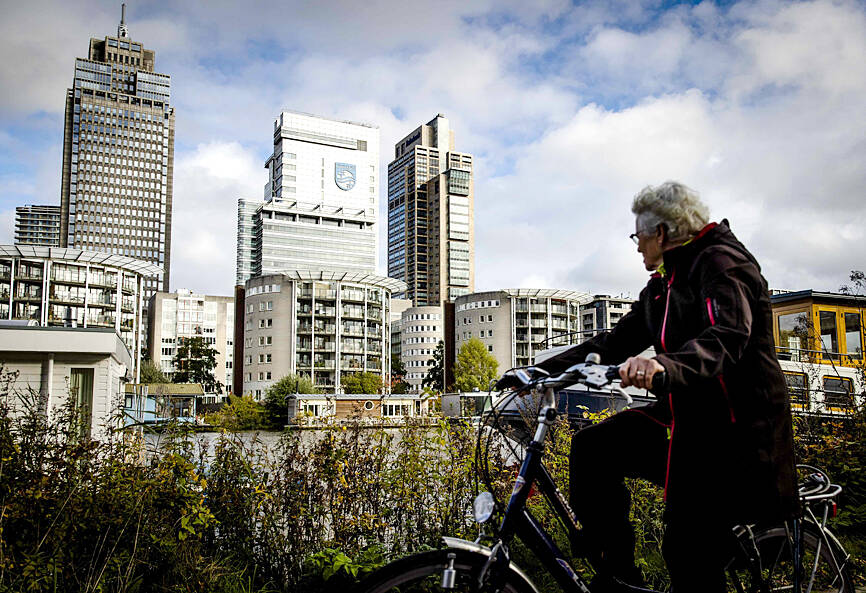Royal Philips NV yesterday said that it had reached a US$1.1 billion deal to settle US lawsuits over faulty sleep machines that have dogged the Dutch medical device maker.
The company’s shares soared more than 45 percent on news of the settlement, which was less onerous than feared by some shareholders.
Philips has been battling a series of crises since 2021 over its DreamStation machines for sleep apnea, a disorder in which breathing intermittently stops during sleep.

Photo: ANP/AFP
Millions of devices were recalled over concerns that users were at risk of inhaling pieces of noise-canceling foam and fears it could potentially cause cancer.
The company earlier this year decided to halt new sales in the US of the machines made by subsidiary Philips Respironics.
The company has reached an agreement with the plaintiffs “to resolve the personal injury litigation and the medical monitoring class action to end the uncertainty associated with litigation in the US,” Philips said in a statement.
The company said it did not “admit any fault or liability, or that any injuries were caused by Respironics’ devices.”
The agreement addresses claims filed in US courts and other potential cases, it added.
“Patient safety and quality is our highest priority, and we have taken important steps in further resolving the consequences of the Respironics recall,” Philips chief executive Roy Jakobs said in the statement.
“The remediation of the sleep therapy devices for patients is almost complete, and the test results to date show the use of these devices is not expected to result in appreciable harm to health,” Jakobs added.
“We do regret the concern that patients may have experienced,” he said, adding that the settlements were “significant milestones and provide further clarity on the way forward for Philips.”
Philips, which has had to cut thousands of jobs, posted a loss of 463 million euros (US$496 million) over the full year last year.
It yesterday reported a loss of 824 million euros in the first quarter of this year on sales totaling 4.1 billion euros.
Philips said the settlement payments are expected to take place next year and would be funded through cash-flow generation.
The company said it booked a provision of 982 million euros in the first quarter to cover the settlement.
Philips said it also concluded an agreement with insurers to pay Philips 540 million euros to cover Respironics recall-related claims.
“The three biggest litigation cases that we had are now put behind us,” Jakobs said in a conference call.
“We can move on and that’s very important,” he said, while cautioning that it “doesn’t mean that everything is resolved.”

MULTIFACETED: A task force has analyzed possible scenarios and created responses to assist domestic industries in dealing with US tariffs, the economics minister said The Executive Yuan is tomorrow to announce countermeasures to US President Donald Trump’s planned reciprocal tariffs, although the details of the plan would not be made public until Monday next week, Minister of Economic Affairs J.W. Kuo (郭智輝) said yesterday. The Cabinet established an economic and trade task force in November last year to deal with US trade and tariff related issues, Kuo told reporters outside the legislature in Taipei. The task force has been analyzing and evaluating all kinds of scenarios to identify suitable responses and determine how best to assist domestic industries in managing the effects of Trump’s tariffs, he

TIGHT-LIPPED: UMC said it had no merger plans at the moment, after Nikkei Asia reported that the firm and GlobalFoundries were considering restarting merger talks United Microelectronics Corp (UMC, 聯電), the world’s No. 4 contract chipmaker, yesterday launched a new US$5 billion 12-inch chip factory in Singapore as part of its latest effort to diversify its manufacturing footprint amid growing geopolitical risks. The new factory, adjacent to UMC’s existing Singapore fab in the Pasir Res Wafer Fab Park, is scheduled to enter volume production next year, utilizing mature 22-nanometer and 28-nanometer process technologies, UMC said in a statement. The company plans to invest US$5 billion during the first phase of the new fab, which would have an installed capacity of 30,000 12-inch wafers per month, it said. The

Taiwan’s official purchasing managers’ index (PMI) last month rose 0.2 percentage points to 54.2, in a second consecutive month of expansion, thanks to front-loading demand intended to avoid potential US tariff hikes, the Chung-Hua Institution for Economic Research (CIER, 中華經濟研究院) said yesterday. While short-term demand appeared robust, uncertainties rose due to US President Donald Trump’s unpredictable trade policy, CIER president Lien Hsien-ming (連賢明) told a news conference in Taipei. Taiwan’s economy this year would be characterized by high-level fluctuations and the volatility would be wilder than most expect, Lien said Demand for electronics, particularly semiconductors, continues to benefit from US technology giants’ effort

‘SWASTICAR’: Tesla CEO Elon Musk’s close association with Donald Trump has prompted opponents to brand him a ‘Nazi’ and resulted in a dramatic drop in sales Demonstrators descended on Tesla Inc dealerships across the US, and in Europe and Canada on Saturday to protest company chief Elon Musk, who has amassed extraordinary power as a top adviser to US President Donald Trump. Waving signs with messages such as “Musk is stealing our money” and “Reclaim our country,” the protests largely took place peacefully following fiery episodes of vandalism on Tesla vehicles, dealerships and other facilities in recent weeks that US officials have denounced as terrorism. Hundreds rallied on Saturday outside the Tesla dealership in Manhattan. Some blasted Musk, the world’s richest man, while others demanded the shuttering of his